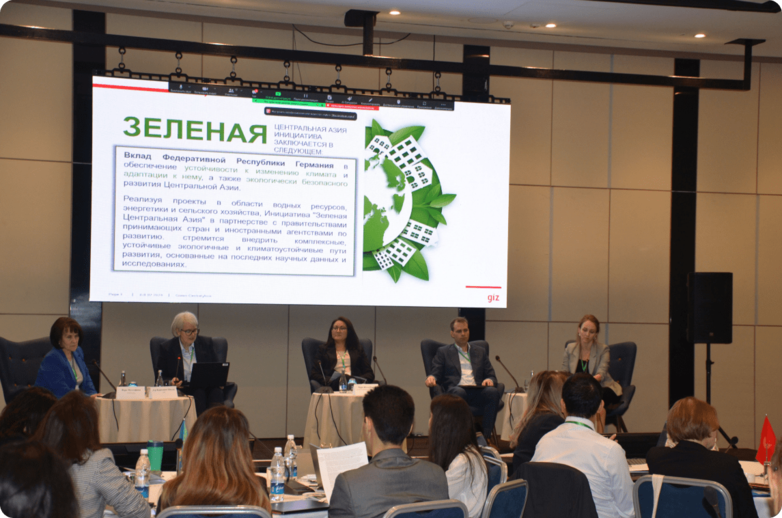Tackling the impacts of climate change through regional cooperation
Green Central Asia II: Transboundary dialogue on Climate, Environment and Security in Central Asia - Bridging borders to enhance regional adaptation and mitigation
 © GIZ
© GIZ
Green Central Asia II: Transboundary dialogue on Climate, Environment and Security in Central Asia - Bridging borders to enhance regional adaptation and mitigation

German Federal Foreign Office

European Union (EU)
European Union (EU)

Kazakhstan, Kyrgyzstan, Tajikistan
Kazakhstan, Kyrgyzstan, Tajikistan, Turkmenistan, Uzbekistan

More
Kazakhstan - Ministry of Foreign Affairs, Kyrgyzstan - Ministry of Foreign Affairs, Tajikistan - Ministry of Foreign Affairs, Turkmenistan - Ministry of Foreign Affairs, Uzbekistan - Ministry of Ecology, Environmental Protection and Climate Change

2024 to 2028

The Helmholtz-Centre Potsdam - German Research Centre for Geosciences (GFZ)
The Helmholtz-Centre Potsdam - German Research Centre for Geosciences (GFZ), the Martin Luther University Halle-Wittenberg, Potsdam-Institute for Climate Impact Research (PIK), the German-Kazakh University (DKU).

Climate, environment, management of natural resources
Central Asia is among the regions of the world most affected by and vulnerable to climate change. The region’s water, food and energy security are not only threatened by the warming climate, but also by environmental degradation and human interventions.
In the last four years, Green Central Asia has established a political, technical and scientific dialogue. It makes a decisive contribution to raising awareness about the importance of regional cooperation on climate security. The governments of the five Central Asian countries adopted a Regional Joint Action Plan in November 2021. Joint activities include a policy dialogue facilitated by inter-governmental working groups, as well as priority projects on climate-sensitive water, land and climate risk management. The centrepiece of the policy dialogue is the elaboration of the Regional Climate Change Adaptation Strategy adopted by all five Central Asian countries.
 © GIZ
© GIZTransboundary cooperation on addressing climate risks and impacts and contributing to conflict prevention in Central Asia is improved.
The Programme aims to improve regional coordination for climate change adaptation with a gender-sensitive approach. It also supports the development of the regionally determined contributions to the global effort to reduce greenhouse gas emissions. Another goal is to improve institutional and individual adaptive capabilities through better knowledge management and scientific cooperation.
The Programme promotes continuing dialogue between policymakers and science, coordination and cooperation with other international organisations and stakeholders as well as with projects financed by the German Government in the field of climate change and security in Central Asia.
Last update: July 2024